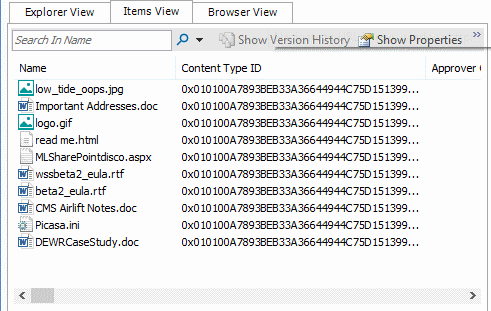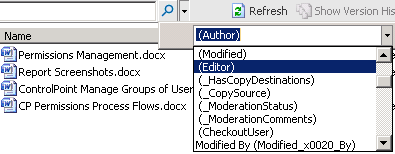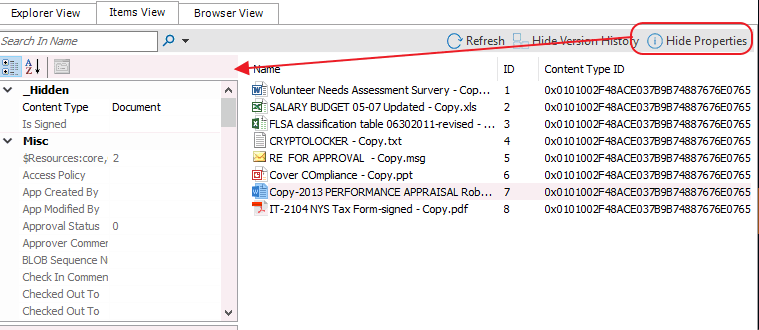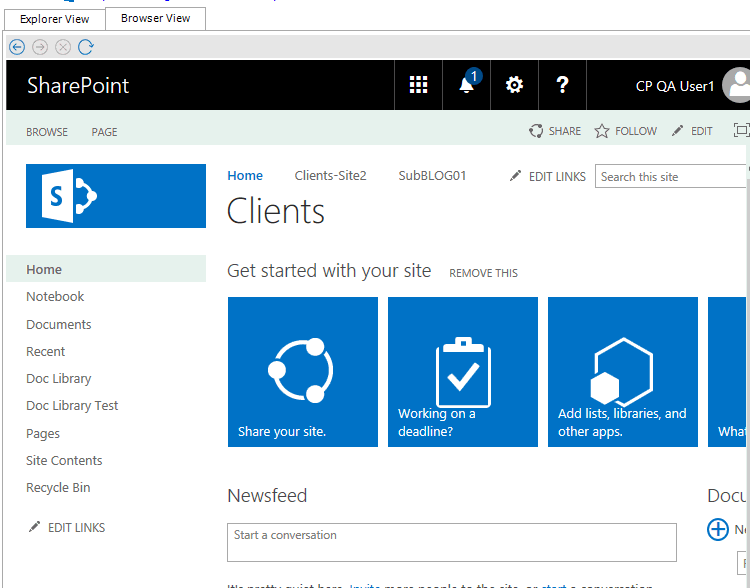Items View Tab
The Items View tab displays any items/documents that exist directly under the selected node (that is, the content of any subfolders under the selected node-will not be displayed), along with column metadata.
There are four main options that are available through this tab. These options are:
·Search To perform a full or partial text search, enter the string in the search box then either and either press <Enter>, or click the magnifying glass icon to run the search.
NOTE: The search will be run on the name column (the FileLeafRef) by default, but you can select a different column to search from the drop-down to the right of the search box.
·Refresh - This button will refresh all of the items in the Items View tab.
·Show/Hide Version History - This button option is only available when the selected document library/list has versioning configured. When this button is selected the Items View tab will be divided into two sections, a top section displaying all of the items/documents and a bottom section displaying all of the versions for the selected item/document.
When an item/document is selected in the top window, all of that item/document's versions will be listed in the bottom half of the window. You can then look at the metadata for each item/document version that exists. This option can be combined with the Show/Hide Properties button.
If the Show Version History button has already been selected, this will change to be a Hide Version History button instead. You can use this option to stop looking at item/document version histories.
·Show/Hide Properties - The Show Properties button allows you to see a list-style view of the available fields (columns) and their values, for a selected item/document. Any value listed in dark text can be edited and within the window.
The fields in the Properties window can also be ordered by category, or alphabetically. By default, the fields are ordered by category, and are listed alphabetically within each category. If listed alphabetically, then all property fields (columns) will be listed in alphabetical order, with no breakdown by category. There are two buttons at the top of the Properties window that can be used to determine what ordering type is used. This option can be combined with the Show/Hide Version History button.
If the Show Properties button has already been selected, this will change to be a Hide Properties button instead. Use this option to close the Properties window.
Browser View Tab
The Browser View displays a view of the content as it would be seen in a web browser for a selected SharePoint node. It is also available if selecting a single item in the Items View. When selected, this tab will display a fully functioning web browser view of the selected content. You can use this Browser View to navigate or work with their content, the same way they would through a normal web browser window.
Jobs List
Jobs in Content Matrix Console can be managed from the Job List. Jobs are listed for migration actions that have already been run, as well as for actions that have been saved.
Using Multi-Select
Multi-select can be used to select several nodes on the source side Explorer View tree and migrate those nodes to a target SharePoint instance. Multiple SharePoint connections can be selected at one time, but only to Disconnect or Refresh those connections. If connected to a SharePoint farm or web application, only a single site collection can be selected at a time, however, multi-select can be used on any sub-sites under a single site collection.
This feature also works for migrating a single list or site into multiple target locations at the same time; for example, if you have a document library that you want to migrate into two or more target SharePoint sites. After the library is copied, any number of desired target sites can be selected, as long as they are all under the same target connection node, and when pasted the list will be migrated to all of the selected target site nodes. The basic cases for multi-select are copying: multiple to one, one to multiple, and multiple to multiple.
For example, if connected to a File Share in the Explorer View, and the navigation tree is expanded, you can select several (Folder A, Folder B, etc.) and these can all be migrated at the same time. After pasting the content all the selected content (Folder A, Folder B, etc.) will be migrated under the target SharePoint node.
In addition to using check boxes to multi-select, you can use <Shift> and the <Ctrl> keys in the conventional way.
Limitations of Multi-Select
There are a few limitations when using multi-select. These limitations are:
·Only one node type can be selected at a time - This means that if a SharePoint site node is selected, then only other site nodes can be selected, and included in the action. If a File Share connection type is made, only nodes under each specific connection can be selected at one time
While the content under those nodes will be migrated (as per the selected options), only other site nodes themselves can be selected. This is the same for SharePoint lists/libraries, and folders. When connected to a SharePoint server only a single site collection can be selected at one time, but multiple sites under the site collection level can be selected.
The first node selected in the multi-select will determine what type of node can be included, and if an invalid selection is made, then the node that you tried to select will only blink. For example, if a list is selected, then only other lists, within the site collection, can be selected. If you try to select a SharePoint folder or site, then this is an invalid selection, and the folder or site will blink.
·Available Context (Right-Click) Menu Options - When using multi-select the options that are available in the context (right-click) menu can change depending on where the multi selection is taking place.





